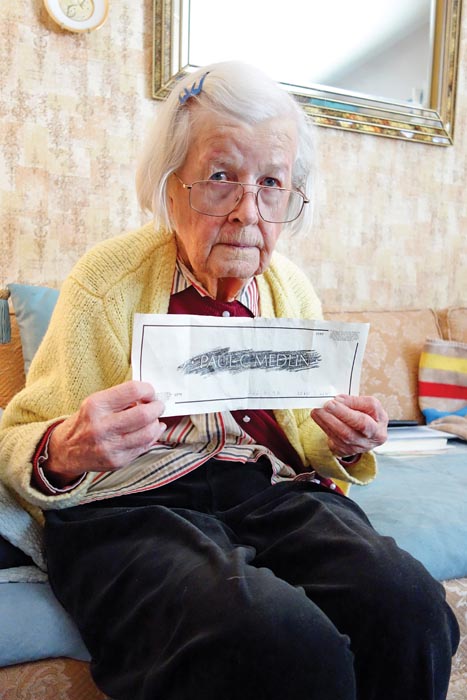
Over the years, SI has honored alumni who have died in service to their country, with the exception of one of its best: Army 2nd Lt. Paul Charles Medlin ’63.
Medlin’s name was inadvertently omitted from the 150th anniversary book, Spiritus Magis, which named 10 who died in WWI, 96 in WWII, one in Korea and four in Southeast Asia during the Vietnam War: Fredrick Riley ’51, Denis O’Connor ’58, Richard Bloom ’60 and Richard Arthur Timboe ’62.
A subsequent issue of Genesis reported on two additional Vietnam casualties: Robert William Reed ’51 and John F. Santos, Jr. ’51.
Then, in 2013, James Stark ’63 wrote to SI regarding Medlin’s death and asked “when you again do a piece on Ignatians who had given their lives for their country, please include Lt. Paul Medlin.”
On Memorial Day 2014, Genesis editor Paul Totah ’75 sat with Lt. Medlin’s 99-year-old mother, Dorothy, and sister, Jane (a 1971 graduate of Mercy High School in San Francisco and an office manager for a Union Square dentist), to tell the story of Medlin’s life and untimely death at 24 on Dec. 14, 1969.
Medlin was the first-born son of Lorin Medlin, a Massachusetts native who worked at Fireman’s Fund Insurance Company, and Dorothy, a third-generation San Franciscan, a graduate of St. Peter’s High School and a bookkeeper for Mount St. Joseph’s–St. Elizabeth’s orphanage. Medlin also had a younger brother, Mark, who worked as a CalTrans supervisor before his retirement.
Both Dorothy and Jane described Paul as a quiet and caring young man who enjoyed reading. “Before he left for Vietnam, he told me to read Wuthering Heights and Lord of the Rings,” recalled Jane.
“He spoiled me,” she added. “For Easter, he would hide chocolate eggs around the house and then give me hints as to where they were. I thought he was so smart. I had no idea how he knew where they were.”
Jane also recalled his love for drawing. “He sketched Mick Jagger in a flip book for me that turned into an animated cartoon, and he was always drawing trees and flowers.”
He also loved music, and he taught his siblings about the burgeoning rock scene in San Francisco. Later, in Vietnam, he bought a guitar and taught some of the men in his command how to play. His sister also wrote to him about new album releases and concerts in San Francisco.
At St. Michael’s Grammar School, he joined the Cub Scouts and Boy Scouts. At SI, he met Pete Dito ’63, and the two became lifelong friends.
Dito, now a director of economics and regulatory analysis in Southern California, described Medlin as “a sensitive person and a poet, who had remarkable expressions for what he saw. One day he came to visit me in Spokane, and we hopped a freight train to Seattle just for the adventure. One side was nailed shut, and he noted that we were only seeing half the world. When the train came to a stop, we wondered why it stopped at a bleak, snow-covered landscape. We leapt out of the boxcar, peered underneath it to investigate and saw a city. Paul was right. You can’t just look at half the picture. You need to see it all.”
While in high school, both men studied Russian after school with Bill Morlock ’49. After classes, the two would argue about which bands were the best. “He loved Duane Eddy and Johnny Cash, while I insisted the Beach Boys and Bobby Rydell were the best. We went head to head all the time.”

After graduating from SI, Medlin attended Humboldt State, where he earned his degree in forestry. (See photo above.) He also spent his summers fighting fires in the mountains of the Sierras throughout the state.
“Paul also had a great sense of dry humor,” said Jane. “One day in college, he took the hinges off his door and sat waiting for his roommates to return. He loved to play tricks like that.”

While in college, Medlin met Cheryll Arvola, a student at UC Davis, and the two became engaged. Later, he served as best man for Dito (see above), and Medlin asked Dito to act as his best man once he returned from his tour of duty.
After his college deferment ran out, Medlin enlisted in the Army despite his parents’ pleas for him to join the Navy. “The recruiters promised that they would place him in the Army Corps of Engineers,” said Jane. “He thought that would help him work in forestry when he returned, but they lied to him and assigned him to the infantry.”
After graduating from the U.S. Army Infantry Officers Candidate School in Ft. Benning, Ga., in 1969, Medlin returned home for a brief visit. Before he left, Dito visited him at the Medlin home on Foote Street. “He was so upset,” recalled Dito. “He told me, ‘You know Pete, I feel like I’m not coming back.’ I told him he was crazy; that really hit me hard.”
Medlin landed in Vietnam on Oct. 4, assigned to the 9th Infantry Division, 2nd Battalion, 47th Infantry Regiment, C Company. He proved popular with the men under his command, many of whom later wrote tributes in various online sites paying homage to Medlin and his fallen comrades.
In the Long An Province in Southern Vietnam on the Mekong Delta, Medlin befriended a fellow officer who warned him about one particularly dangerous area that, in December, Medlin was assigned to patrol.
That officer, on his way home from Vietnam, stopped by the Medlin home to tell the Medlin family the story of Paul’s death. “He told us that Paul had seen something suspicious,” said Jane. “He ordered his men to stay behind while he went to investigate. While bending down to have a closer look, he must have tripped a wire, because a device exploded in his face, fatally wounding him.”
Medlin was flown by helicopter to an Army hospital where he was given last rites and treated before his death.
Shortly after his death, a package of letters arrived to his base in Vietnam. They had been written by Jane and by her Mercy classmates to support Paul and his fellow troops.
The day of Medlin’s death, St. Michael’s pastor Fr. Cloherty called Lorin and asked to come over. “My father kept asking ‘Why? Why?’” said Jane. “We all knew what the visit meant.”
Medlin’s funeral Mass was held at St. Michael’s with burial following at the Golden Gate National Cemetery in San Bruno. “I will never forget the 21-gun salute, the folding of the flag or the photo taken that day showing the grief in the faces of my family and of Cheryll, who took years to get over this loss,” said Jane. Cheryll finally did marry, 10 years later.
Medlin’s family continued to honor and mourn him. Dorothy donates each month to support wounded warriors, and the family has had monthly Masses said in his memory, first at St. Michael’s, then at Corpus Christi and now at St. Stephen’s Church.
“The wound of his loss never closed for our family,” said Jane. “The only good thing is that Paul didn’t return maimed. He loved the outdoors so much, it would have killed his spirit. We are also grateful he wasn’t captured, as we couldn’t have lived through that ordeal.”
The family still feels grief and anger, said Jane. “We should never have gone to Vietnam, and we stayed there forever knowing the war could never be won. The wars in Afghanistan and Iraq brought back memories for me. Every week, while getting ready for Mass, I would have the news on and see the names and ages of those who had died the previous week. They were all so young.”

Jane and Mark haven’t visited the Vietnam Memorial in Washington, D.C., but they do have a rubbing of Paul’s name (Panel/Row 15W, 56), one made by Jane’s grammar school classmate John Barisone ’71. “I don’t know if I could face the Wall in person,” said Jane. “It goes on and on and on and signifies both a finality and an incredible waste of life. It’s a monolith of waste.”
Dorothy and Jane still live in their family home in the Outer Mission surrounded by photos of Paul, including one taken the day he left for Vietnam, smiling in his uniform.
“Before he left, he asked me to take care of my mother,” said Jane. “So that’s what I’m doing as best I can. We don’t sit around crying, but the pain doesn’t go away.”

